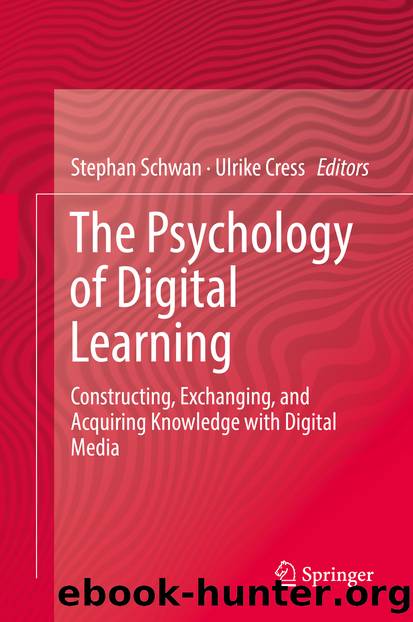The Psychology of Digital Learning by Stephan Schwan & Ulrike Cress

Author:Stephan Schwan & Ulrike Cress
Language: eng
Format: epub
Publisher: Springer International Publishing, Cham
The Focus on Own Goals and the Selfishness of Those High in Power
Many social relations are characterized by (factual or perceived) hierarchical structures, that is, differences in social power. Going beyond the previous paragraphs that focused on equally powerful communication partners, this section examines hierarchical differences as another type of social constellation that can evoke self-serving motives.
Social power comprises asymmetric control over resources (e.g., money, social appreciation, social contacts; Fiske & Berdahl, 2007) and represents a characteristic of a social relation between at least two individuals. As such, the power-holder controls resources that the powerless person(s) depend(s) on and is relatively independent from others. Resulting from this independence, power provides freedom to act and to focus on currently activated goals (Guinote, 2007; Keltner, Gruenfeld, & Anderson, 2003).
Our own research investigated how (high versus low) social power guides (a) the (mental) effort individuals put into preparing an information exchange with others and (b) their willingness to share important information. First, we focused on their preparation when composing e-mails to communication partners. Due to its asynchronous nature, e-mail provides the opportunity to think one’s actions through: Individuals can carefully construct and revise a message before sending it off, which can contribute to effective communication (Walther, 1996, 2007). Imagine, for instance, a professor and her student exchanging e-mails about a class. While the student will likely think extensively on how to best frame her requests, the professor might promptly compose a reply without thinking too much about how to respond. As social power facilitates goal-directed behavior (Guinote, 2007), we expected power to reduce preparation times during e-mail cmc though potentially without diminishing communication effectiveness. Results of an experiment confirmed this prediction: Participants in a high (versus low) power role thought less about their actions while composing their e-mail requests. Interestingly, this did, indeed, not harm the quality of their messages; in contrast, powerful individuals communicated their requests more persuasively than those low in power (Scholl & Sassenberg, 2014b).
Notably, this does not imply that power always diminishes such mental preparation for information exchange. In follow-up studies, we found that power-holders better adapt to the task at hand: More than the powerless, power-holders think their actions through when the task at hand requires them to do so (Scholl & Sassenberg, 2015), or when a prior exchange failed to produce the desired outcome (Scholl & Sassenberg, 2014a). In sum, power seems to enable individuals to better prepare for cmc with others.
Beyond such preparation for information exchange, power alters the willingness to share information with others. Due to their independence, power-holders often tend to act selfishly and in their own interest (for an overview, see Lammers, Dubois, Rucker, & Galinsky, 2015). Moreover, individuals high in power aim to keep the status quo, for instance, by protecting their resources against potential exploitation by the powerless (Inesi, Lee, & Rios, 2014). This implies that those high in power (e.g., team leaders) may tend to withhold important information more than powerless individuals, in order to take care of their resources and retain the status quo (i.
Download
This site does not store any files on its server. We only index and link to content provided by other sites. Please contact the content providers to delete copyright contents if any and email us, we'll remove relevant links or contents immediately.
The Art of Coaching Workbook by Elena Aguilar(51159)
Trainspotting by Irvine Welsh(21636)
Twilight of the Idols With the Antichrist and Ecce Homo by Friedrich Nietzsche(18620)
Fangirl by Rainbow Rowell(9228)
Periodization Training for Sports by Tudor Bompa(8252)
Change Your Questions, Change Your Life by Marilee Adams(7758)
This Is How You Lose Her by Junot Diaz(6875)
Asking the Right Questions: A Guide to Critical Thinking by M. Neil Browne & Stuart M. Keeley(5757)
Grit by Angela Duckworth(5601)
Red Sparrow by Jason Matthews(5465)
Paper Towns by Green John(5177)
Room 212 by Kate Stewart(5105)
Ken Follett - World without end by Ken Follett(4722)
Housekeeping by Marilynne Robinson(4436)
The Sports Rules Book by Human Kinetics(4379)
Papillon (English) by Henri Charrière(4261)
Double Down (Diary of a Wimpy Kid Book 11) by Jeff Kinney(4261)
The Motorcycle Diaries by Ernesto Che Guevara(4089)
Exercise Technique Manual for Resistance Training by National Strength & Conditioning Association(4060)
